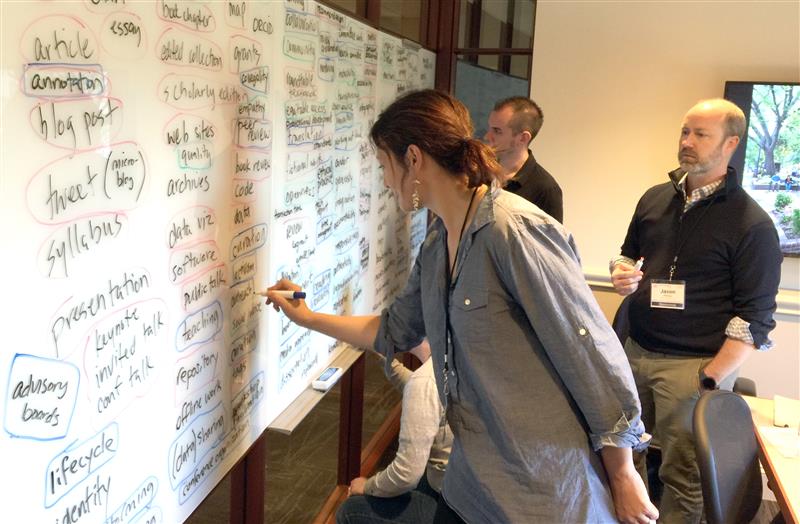Michigan State University has received a $695,000 grant from The Andrew W. Mellon Foundation to fund the Humane Metrics for the Humanities and Social Sciences (HuMetricsHSS) initiative, an international partnership that supports the development and implementation of new methods for assessing the nature and quality of scholarship in the humanities and social sciences over the next 18 months.
The HuMetricsHSS initiative aims to create and support a values-based framework that enables humanities and social sciences scholars to tell more textured and compelling stories about the impact of their research and the variety of ways it enriches public life. It is led by an international group including Nicky Agate, Assistant Director of Scholarly Communication and Digital Projects at Columbia University; Rebecca Kennison, Executive Director and Principal of the nonprofit K|N Consultants; Christopher P. Long, Dean of the College of Arts & Letters at Michigan State University and Professor of Philosophy; Jason Rhody, Program Director at the Social Science Research Council; Simone Sacchi, Open Science Librarian at the European University Institute; Bonnie Thornton Dill, Dean of the College of Arts and Humanities (ARHU) at the University of Maryland and Professor of Women’s Studies; and Penny Weber, Projects Coordinator at the Social Science Research Council.
At the heart of this work is the recognition that the culture of higher education is shaped by practices of scholarly communication. In an era in which metrics increasingly shape how scholarship is undertaken and evaluated, HuMetricsHSS takes an innovative approach that begins by identifying values that enrich practices of scholarship in order to expand the breadth of what counts as a “scholarly contribution.”

By creating a more “humane” metrics framework, the initiative seeks to diminish the broad reliance on metrics that either presupposes value as reflected in “neutral” indicators (such as citations) or that fails to consider the question of value at all in a scholar’s work. Instead, HuMetricsHSS advances a practiced-based approach that is holistic, reflective, and transparent.
“By orienting scholars and institutions toward the values about which they care most deeply and by providing them with structured ways to intentionally embody those values in the practices by which knowledge is created, shared, and evaluated, we hope to help individuals, departments, colleges, and academic institutions reshape the culture of higher education so that it is more humane, supportive, and just,” Long said.
Over the next 18 months, the Mellon grant will fund onsite values-focused workshops at a number of institutions in the United States and the European Union, research into the current processes of scholarly evaluation, the creation of a values toolkit, and continued development of HuMetricsHSS software.
“The work Dean Long and I are doing to engage our colleagues across the Big 10 Academic Alliance will help the HuMetricsHSS team assess how campuses in the United States and European Union utilize metrics in HSS,” Thornton Dill said. “This work will provide a framework for measuring impact that reflects the values and modes of inquiry in our fields.”
By the end of this grant period, the research team anticipates that pilots of the HuMetricsHSS framework will be deployed by several institutions at some level and progress will be made on building a replicable model to advance adoption beyond these pilots. The team also is working on more direct engagement and robust collaborations with other like-minded projects and related institutions and furthering research software infrastructure for scholarly and administrative use.
This work will provide a framework for measuring impact that reflects the values and modes of inquiry in our fields.
BONNIE THORNTON DILL, DEAN OF ARHU AT THE UNIVERSITY OF MARYLAND
“Success in achieving these goals will in part be measured by an increase in those using the toolkit and undertaking these critical conversations even without our direct involvement,” Long said. “While we are hopeful that HuMetricsHSS will gain traction during this phase of the work, the next phase — designed to expand and reinforce the work done now — will require considerable additional funding to integrate the values-based HuMetricsHSS approach into all aspects of faculty and staff development at a wide diversity of institutions around the world.”
This is the second Mellon grant received by Michigan State University to support the HuMetricsHSS initiative. The first was for $309,000, which funded an 18-month pilot that included a series of workshops bringing together scholars from a variety of institutions in the United States and Europe to identify and define values and practices that enrich scholarship. From these workshops, the HuMetricsHSS team further refined their approach to better recognize, promote, and nurture scholarly practices by creating a small set of use cases for applying the values-based framework. The second round of funding will allow a deeper institutional engagement both in the United States and the European Union.
Header image from left to right: Dean Christopher P. Long, Dr. Jason Rhody, Penny Weber, Dr. Nicky Agate, Dr. Rebecca Kennison, and Dr. Simone Sacchi
Not pictured: Dean Bonnie Thornton Dill